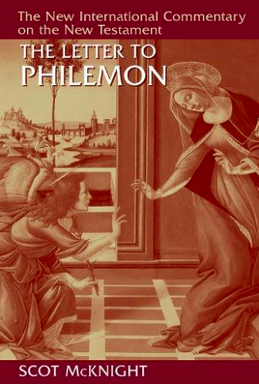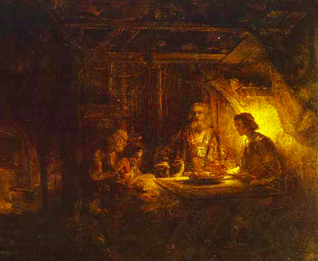 Over the past few months I have worked on a paper for presentation at this year’s annual meeting of the Evangelical Theological Society regarding the New Testament teaching of the “gathered-church” as God’s platform (the space and place) for challenging and offering an alternative to the tiers of human hierarchies. This is how God in Christ by the power of the Holy Spirit addressed the issues of slavery, oppression, inequality, and tyranny. My conclusions were affirmed (at least to me) when—after the paper was done and presented—I picked up Scot McKnight’s new commentary on Paul’s Letter to Philemon. His own thesis and conclusion offered a similar framework as I regarding what Paul was seeking to accomplish in his Letter to Philemon. From McKnight’s commentary regarding Onesimus, Philemon, and Paul . . .
0 Comments
 Trajectory Application: Two NT Case Studies that Address Tyranny and Oppression (B) The curious case-study of Philemon and Onesimus. The story of Paul, Philemon, and his run-away slave, Onesimus, is as close a NT case study there is regarding how the gospel applies to slavery. The primary objection of some, however, is that Paul wasn’t at all clear nor direct (enough) about it. Our comfort level needs unambiguous NT advocacy against slavery and the freeing of “household” slaves. Yet, this would not have helped slaves in the NT world. Some other social, cultural, and anthropological paradigm shifts needed (and in many ways, still need) to change first—a revolution striking at the heart of tiers of human hierarchy. As was the Greco-Roman world of Paul’s day, advocating for emancipation of slaves can be more about our “enlightenment” than about a slave’s (i.e., a person’s) inherent value, dignity, and equality.[1] Nevertheless, based on the household gathered-church and its habitus outlined thus far, Paul seems to have had something much more ambitious in mind than instructing Philemon to simply free Onesimus. A runaway slave was the most vulnerable of all, a de-housed situation revealing all the aspects of the subhuman caste: any protection in society is absent, confirming Roman citizenship is impossible, all ties to a “household” are lost, and, thus, any rights or security the slave would have had are forfeited. Certainly, a female runaway slave faced certain destitution and probably death. If the runaway slave was a male child of the head of the household (i.e., paterfamalia), he would not have been able to “compete” with legitimate children. A slave was most certainly a filius neminis (a son of no one)[2] and this would have been a perilous state to be on the run. A runaway or even a freed slave would go into permanent social subordination or into exile—not truly free. A slave in the Roman world was denied any legal standing--non habens personam (not having a face) before the law. Onesimus’ options in the real world would not have been at all positive—nor free of the tiered hierarchy of human beings. As Sarah Ruden points out, “This is what makes the debate over the letter to Philemon, concentrating on the question of legal freedom, so silly.” Freeing Onesimus directly into Roman society would have put his life at risk. Had Paul instructed Philemon to free Onesimus apart from the slave’s return to the household gathered-church, it would not have worked out well for Onesimus. Paul desires Onesimus’ return to the safest and most secure place, the one space in the Roman empire where the slave would find equal footing—the household gathered-church. First, Paul’s letter to Philemon aligns well within the venue of the household gathered-church, for it was, after all, addressed as well to the church in Philemon’s house (1:2c). Second, Paul’s appeal to Philemon established them both—Onesimus and Philemon—on the same platform (counter to every cultural thought and social boundary): For I have derived much joy and comfort from your love, Philemon, because the hearts of the saints have been refreshed through you (v. 7); and, Onesimus was to return no longer as a bondservant but . . . as a beloved brother (v. 16). This level position is further established by gospelizing Philemon’s own relationship to Onesimus--but how much more to you, both in the flesh and in the Lord (v. 16c)—that he would receive his former slave back as Philemon would receive Paul (v. 17b). Fourth, Paul establishes Onesimus’ status in the community of believers drawing upon his state of “usefulness.” Runaway slaves were nobodies and nothing apart from the “household” because they were useless. The value of a slave was pragmatic, utilitarian, and showed the shame of a tiered human hierarchy. As a runaway, Onesimus was not useful to Philemon, however now he was useful to both Paul and Philemon: Formerly he was useless to you, but now he is indeed useful to you and to me (v. 11). The scandal was that Onesimus was “useful” because he was a brother in Christ and was to be received as full member of the household gathered-church in Philemon’s home. Finally, Paul further establishes the relationship status, which reflects the gospel, the nature of the household gathered-church, and the equality of those welcome to recline at table: I appeal to you for my child, Onesimus, whose father I became in my imprisonment (v. 10). Heirship—sonship and adoption—was established for Onesimus in terms of the faith. Paul was not merely asking Philemon to forgive his runaway-slave, but to embrace him, now, as a brother in the Lord, a full participant at table: that you might have him back forever . . . as a beloved brother and receive him as you would receive me (vv. 15–16). Paul’s appeal to Philemon is in line with NT teaching regarding the household gathered-church and its habitus. The apostle’s approach, a trajectory application of the gospel, was far more ambitious than making Onesimus legally free—a condition in which Onesimus would have been far more vulnerable—choosing rather to affirm his humanity, that is a full human being within the household gathered-church. Paul’s foresight and application of the gospel in welcoming the former slave into the full ranks of membership in Christ’s church, a “son” equal to his former “master” changed everything—and addresses oppression in the company of unequals. Paul is offering a rather subversive paradigm within the seditious gathered-church that is reflective of the Ephesians household-table. The apostolic and early church, without public protests or any actual campaign against slavery, over time weakened the institution and in some places causing it to disappear. [3] The gathered-church is the space God applies the gospel among unequals that eradicates tiered human hierarchies. Personhood. Although it is somewhat anachronistic to speak of personhood with respect to the Bible, it would not be possible to speak of “persons” today, for our capacity to call someone a person is a “consequence of the revolution in moral sensibility that Christianity brought about.”[4] The concept of person had a far more limited function before the appearance of the gathered-church. The Greek prosōpon (as the Latin persona) was not used to indicate “a person” in a modern sense. The etymological meaning is related to a mask (a false face) worn by actors in a Roman theater. The Roman court system picked up the nuance of persōna, a face recognized before the law. In NT times, it was more accurate to refer to one’s standing before the law than to refer to someone as a person.[5] The “role” an individual played amid social institutions helped prescribe Greco-Roman social mapping as it was diffused through the Roman household. Non habens personam (not having a face) was the lot of most women, almost all children, and, certainly, all slaves. However, the presence of Christianity through household gathered-church habitus penetrated the warp and woof of social mapping. Eventually slaves, children, and women became known as persons. Our ability to acknowledge another as person with intrinsic value and worth originates, not only from the gospel as message, but also from the actual habitus that reformed social mapping. The habitus of the household gathered-church, which met for a meal, a kiss, fellowship, celebration, and apostolic instruction, set in motion the redeeming and, thus, reforming of social mapping, ending tiered hierarchies of humanity. [1] Sarah Ruden, Paul Among the People: The Apostle Paul Reinterpreted and Reimagined in His Own Time (New York: Image Books, 2010), 154. [2] Ruden, Paul Among the People, 165. [3] Ruden, Paul Among the People, 168. [4] Hart, Atheist Delusions, 167. [5] E.g., Jesus did not have “person” before Pilate (Atheist Delusions, 167); e.g., how blacks were not recognized before the law as a person prior to emancipation and the ratification of the 13th Amendment of the US Constitution (December 6, 1865) This is a thread consisting of parts of a a recent paper presented at the 2017 Evangelical Theological Society's annual meeting in Providence, RI. The goal is to develop an anthology of essays (by various authors) on the subject, Christian Responses to Tyranny. Part 1 | Part 2a | Part 2b | Part 2c | Part 3 | Part 3a | Part 3b | Part 4a | Part 4b | Part 5 For the entire thread (remember to scroll backwards for previous posts) << Gathered-church >>
|
AuthorChip M. Anderson, advocate for biblical social action; pastor of an urban church plant in the Hill neighborhood of New Haven, CT; husband, father, author, former Greek & NT professor; and, 19 years involved with social action. Archives
February 2024
Categories
All
|
Pages |
More Pages |
|
 RSS Feed
RSS Feed